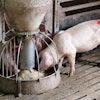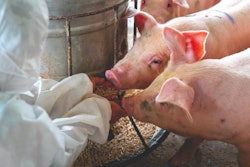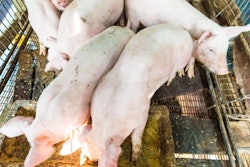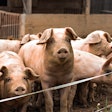
Reporting new cases of African swine fever (ASF) in domestic pigs over the past week have been Bulgaria, Moldova, Poland, Romania and Russia.
Over the past week, Romania is the European country that has reported the highest number of new cases of African swine fever (ASF) among domestic pigs.
A total of 488 pigs were involved in the 28 outbreaks confirmed by the Romanian veterinary authority. According to the official report to the World Organisation for Animal Health (OIE), all these outbreaks started during the month of September. They were widely distributed across the country.
Up to October 4, Romania has recorded a total of 747 ASF outbreaks in domestic pigs so far this year to the European Commission (EC) through its Animal Disease Notification Service. This is around 75% of all the region’s total outbreaks, and the Romanian figure has risen by 144 since the previous update four weeks previously. For the whole of 2019, Romania accounted for 1,724 of the total of 1,908 recorded outbreaks.
2 further outbreaks confirmed in Poland
Over the past week, the Polish chief veterinary office has recorded two new outbreaks among domestic pigs. These involved small units of 5 and 27 pigs in provinces that have recorded previous cases.
Since the first cases were confirmed in Poland in March, the number of outbreaks among domestic pigs now stands at 99. The number of pigs directly impacted is just under 57,000.
ASF re-emerges in Bulgaria, Moldova
After a brief absence, the agriculture ministry reports that ASF has returned to Bulgaria. According to the OIE report, 11 cases including eight deaths were recorded at a farm in Lovec county at the start of this month. The remaining 546 pigs have been destroyed. Source of the infection is unknown.
ASF has also been detected in a backyard herd in the Republic of Moldova. All six pigs died at the premises in Glodeni at the end of last month. This is only the nation’s second outbreak in domestic pigs this year. Located in the west of the country, this district borders Romania.
ASF developments elsewhere in Europe
In western Russia, one of the four latest outbreaks of ASF was on a large farm with more than 34,600 pigs in Voronezh oblast (Central federal district). The agriculture ministry also registered with the OIE two outbreaks in backyard herds and one village, all in Samara oblast (Volga federal district).
Ukraine’s veterinary authority has declared to the OIE that the ASF situation in “resolved” in Ivano-Frankivsk oblast. The disease was detected in a backyard herd in this western region at the end of August, but no further outbreaks have occurred since that time.
Up to October 4, there have been 919 outbreaks of ASF among domestic pigs in Europe since the start of 2020, according to the EC. The total has risen by 166 since the previous update on September 6.
From this source, the worst affected country has been Romania (747 outbreaks). In second place is Poland with 98 registered outbreaks, while Bulgaria has recorded 19. Other countries that have recently reported ASF outbreaks in domestic pigs to the EC are Moldova, the Republic of Serbia and Slovakia. While covering a number of countries that are not members of the European Union, EU figures do not include Russia.
Germany records 50th ASF case in wild boar
Since the first cases was confirmed in wild boar last month, total ASF cases in Germany now stand at 50, according to the federal agriculture ministry. All have been located in the eastern state of Brandenburg. Of the total, 49 infected animals have been found in one of two municipalities. The other case, reported last week, was in the district of Märkisch-Oderland, which is also near to border with Poland, but outside the previously defined “ASF danger zone.”
Other European states reporting cases of ASF among their respective wild boar populations to the OIE over the past week are Hungary (40 animals), Romania (7), Russia (6) and Latvia (2).
Based on EC figures, the total number of ASF cases among European wild boar so far this year has reached 8,780 (up to October 4). This represents an increase of 437 over the previous four weeks.
According to this source, Hungary had recorded the most outbreaks — 3,569 — which is a jump of 114 over this period. Now standing at 3,329, Poland’s total has risen by 177. Other European states to have confirmed recent ASF outbreaks to the EC so far this year are Romania (677), Bulgaria (431), Latvia (218), Slovakia (176), Lithuania (172), and Estonia (49).
Asia: More backyards affected in Russia’s Far East
There have been four new ASF outbreaks among backyard herds in Russia’s Far Eastern federal district, according to the latest OIE report. Presence of the virus was confirmed between August 7 and September 15, and affected a total of 76 pigs. Three of the outbreaks were in Primorsky krai, and the other was in Khabarovsk krai.
Over the past week, the agriculture ministry has declared to the OIE that the ASF situation has been “resolved” in another part of the Far Eastern district. During July, there were two confirmed outbreaks among backyard herds in Zabaykalsky krai, and one wild boar in the same area tested positive for the virus. No further cases have been detected since that time.
According to the latest situational update from the OIE, there have been 166 ASF outbreaks in five regions of Russia’s Far Eastern district. Of these, 39 outbreaks are still ongoing. The number of pigs directly affected stands at 4,767.
South Korea prepares for farms to reopen
Authorities in South Korea have drawn up detailed guidelines to prevent the spread of contagious animal diseases, reports Yonhap. These form part of the preparations for the reopening of pig farms that were closed as the result of ASF outbreaks last year.
To raise biosecurity standards, all farms that have experienced ASF outbreaks must be enclosed by a 1.5-meter fence. A disinfection station is required at the farm entry point, and facilities must be in place to dispose of animal wastes.
South Korea experienced 14 farm ASF outbreaks in September and October 2019, but none since that time. According to Yonhap, around 400,000 pigs were culled nationwide to control the disease.
The number of wild boar that have tested positive for the virus stands at 756. All these animals were found in the border area with North Korea.
ASF threat persists in the Philippines
Continued threats of ASF has underpinned the strengthening of controls in Negros Occidental, according to the Philippine News Agency (PNA). After the recent discovery of illegal pork in a shipment with other meats, inspections have been stepped up at the province’s ports and airports.
Located in the Western Visayas region, Negros Occidental has so far reported no cases of ASF.
According to the same source, around 260 farmers in Bataan province (Central Luzon) — whose pigs were culled to control the spread of ASF — have received financial compensation for their losses from the government. Some of those similarly affected in North Cotabato (Soccsksargen region of Mindanao) have been supplied with goats to replace their pigs.
ASF was first reported in the Philippines in September 2019. Since that time, 365 outbreaks have been recorded, according to the OIE’s latest situational update. Of the country’s 83 administrative divisions, outbreaks have been confirmed in 27. Total direct losses now exceed 342,000 pigs.
View our continuing coverage of the global African swine fever situation.


















